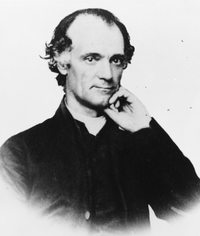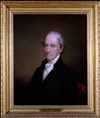
Source: Link
WETHERALD, WILLIAM, educator, Society of Friends (Quaker) preacher, and Congregational minister; b. 26 Sept. 1820 in Healaugh (near Reeth), England, son of John Wetherald and Isabel Thistlethwaite; m. 17 March 1846 Jemima Harris Balls, and they had 11 children, including Agnes Ethelwyn*; d. 21 Aug. 1898 in Banbury, England.
William Wetherald’s mother, who died when he was five, came from a North Country Quaker family and William was sent at the age of nine to Ackworth, a Quaker school in Pontefract. He later stated that the school was formal and unsympathetic but that he “had learned how to learn.” The experience of the cold routine and the rigid system of punishment without tenderness was to influence his own more liberal, though strict, pedagogical principles. In February 1834 his father, a butcher by trade, immigrated to Upper Canada with two of his eight children, settling on a farm in Puslinch Township. William, with a sister and two younger brothers, departed 13 months later to join their father and, once they had arrived, the children had to share in the arduous work of clearing the wilderness. William (of delicate physique) determined to become a teacher. Mostly self-taught, he read voraciously and, mainly working at night by candlelight, he spent seven years cross-referencing the Bible.
At the age of 23 he secured a position as a teacher in nearby Eramosa Township and seven years later, in 1850, he opened a boarding-school for boys in Rockwood, a village near Guelph. Annual board and tuition was set at £13 for boys under 12, £16 for those 12 to 16, and £20 for those over 16, and entrance requirements were “knowledge of the English language and the determination to study.” Wetherald, who did most if not all of the teaching himself, offered instruction in “English grammatically, Writing, Arithmetic, Book-keeping, History, Geography, Latin, Geometry, the theory of Land Surveying, and Algebra.” By December 1855 “Board, Washing, and Tuition” was $12 a month and French, Latin, and Greek (the latter two as “means of mental discipline”) were offered for an additional fee of $1 a month each. The “Commercial and Classical Academy,” housed from 1853 in a stately three-storey building “capable of accommodating from 50 to 60 pupils,” quickly established a high reputation in Upper Canada.
Although a strict disciplinarian, Wetherald won the loyalty and respect of the students by his intellectual powers and moral conviction. He gave punishment with tenderness, which usually brought marked improvement in the offender. He could awaken trust and confidence, and, with the help of his wife, he aimed at an atmosphere in the school of a well-adjusted family. A brilliant chess player, he encouraged sports, in which he also participated. His natural sensitivity made him instantly aware of the inner needs of the individual and his magnetic personality was said to allow him to hypnotize instruction into a pupil. He himself attributed whatever he had achieved to “knowing each scholar – not as a member of a class or community but as an individual” and to sharing their sorrows, encouraging their efforts, and praying with them, not for them. The academy’s illustrious alumni included businessman Sir Adam Beck*, politician Arthur Sturgis Hardy*, educator Archibald MacMurchy, railway magnate James Jerome Hill*, and surgeon Alexander Hugh Ferguson*.
In 1864 Wetherald gave up the responsibility of running Rockwood Academy (which eventually declined with the growth of public education and closed in 1882) and responded to a call to become superintendent of Haverford, a Quaker college near Philadelphia. At this time the Society of Friends was experiencing a period of upheaval, and the managers of the college expected him to re-establish discipline and faithfulness to Quaker ways. The annual report in 1865 stated that there had been a great improvement due to the disciplinary measures instituted, but Wetherald felt that this achievement had alienated him from the students. He returned to Upper Canada in 1866 and settled with his family on a farm, Tall Evergreens, near Fenwick in Pelham Township. He then began his second vocation.
Before leaving Upper Canada in 1864, Wetherald had been active, as had other members of his family, in the Orthodox (evangelical) branch of the Society of Friends in Rockwood and “his gift in the ministry had been acknowledged” by the Pelham Monthly Meeting. Following his return he gave himself entirely to the ministry and travelled extensively in Canada, the United States, and Great Britain. A later memorial stated, “The record of these unnumbered journeys, of these countless sermons, has never been kept, save in the hearts of those who heard him and loved him.” He was an active participant in the Pelham Monthly Meeting and, from 1867, in the Canada Yearly Meeting, serving the latter as clerk in 1879. At the first Canada Yearly Meeting, in Pickering in 1867, he preached to an overflow crowd. A 13-year-old girl who was present would later write, “He stood in a wagon, and in his own sweet, tender manner pointed the people to the way of salvation.” Wetherald’s calm approach was demonstrated when, during the same period, a noisy camp meeting near his home was disturbing his pondering of a chess problem. A local youth who was particularly affected by the emotion of the moment burst in upon him exclaiming, “Mr. Wetherald, rouse yourself! We are all going straight to perdition!” Wetherald answered with dry humour, “Well, if that is the case we may as well go quietly.”
In 1880 Wetherald withdrew from the Society of Friends and in April began serving as minister at the Congregational Tabernacle in St Catharines (although he was not ordained until 1 August). After a “fruitful and peaceful” ministry there, he resigned on 30 Dec. 1885 effective at the end of June. He then returned to the Society of Friends and on 15 Dec. 1887 at the Toronto Monthly Meeting was “acknowledged a Minister of the Gospel.” He was once again active in the Monthly Meeting and Yearly Meeting, and in his later years many came to him for counsel and sympathy. In 1898, whilst engaged in ministry in England, he died suddenly of pneumonia in Banbury, where he is buried.
William Wetherald’s legacy is that of a pioneer educator who believed knowledge was essential for earthly well-being and religious growth for the well-being of the eternal soul. His contribution as a religious leader was his deep personal knowledge of the Bible, his obedience to the call to the ministry, and the intense conviction that he radiated.
AO, Hist. plaque descriptions, “Rockwood Academy, 1850–1882,” 21 June 1962; MS 99, William Wetherald, letter-book, 1859–62. Haverford College Arch. (Haverford, Pa.), Haverford College, faculty minutes, 4 April 1865; report of managers to Haverford School Assoc., 5 May 1865. Haverford College Library, Quaker Coll., “Dictionary of Quaker biography.” Pickering College Library (Newmarket, Ont.), Arch. of the Religious Society of Friends in Canada, B-1-1-2; B-2-43, 1856–64; B-2-82, 7 Sept. 1887–2 Feb. 1889; D-2-15 (3 copies of A memorial concerning William Wetherald, an esteemed minister of Pelham Monthly Meeting of Friends, n.p., [1899?]) (mfm. at AO). UCC-C, Ontario histories, St Catharines, Congregational Tabernacle [Tabernacle Congregational Church], Lucas to Rannie Pub., 24 May 1967. American Friend (Philadelphia and Richmond, Ind.), 15 Sept. 1898: 864. Canadian Congregational year book (Toronto), 1880–81: 47, 51; 1881–82: 13, 22, 44; 1886–87: 33. Guelph Herald, and Literary, Agricultural and Commercial Gazette (Guelph, Ont.), 9 July 1850. Society of Friends, Philadelphia Yearly Meeting, Philadelphia Quakers, 1681–1981: a tercentenary album, comp. R. H. Wilson ([Philadelphia, 1981]). A. G. Dorland, A history of the Society of Friends (Quakers) in Canada (Toronto, 1927). Hugh Douglass, “The story of Rockwood Academy” (typescript, Guelph, 1962; copy at AO). A history of Haverford College for the first sixty years of its existence, ed. A. C. Garrett (Philadelphia, 1892). R. M. Jones, The later periods of Quakerism (2v., London, 1921). K. M. Richards, “William Wetherald: a biography with footnotes and bibliography” (unpublished paper, Toronto, 1986; copy consulted by contributor). Hugh Douglass, “The history of the Rockwood Academy,” Historic Guelph: the Royal City (Guelph), 23 (1983–84): 4–25. S. Silcox, “Early schools and teachers: William Wetherald and the Rockwood Academy,” School (Toronto), 19 (1930), no.4. A. E. Wetherald, “My father as I knew him,” Canadian Friend (Toronto), 10 (1914–15), no.8: 6–9.
© 1990–2024 University of Toronto/Université Laval
Image Gallery

Cite This Article
Kathleen M. S. Hertzberg, “WETHERALD, WILLIAM,” in Dictionary of Canadian Biography, vol. 12, University of Toronto/Université Laval, 2003–, accessed April 19, 2024, http://www.biographi.ca/en/bio/wetherald_william_12E.html.
The citation above shows the format for footnotes and endnotes according to the Chicago manual of style (16th edition). Information to be used in other citation formats:
| Permalink: | http://www.biographi.ca/en/bio/wetherald_william_12E.html |
| Author of Article: | Kathleen M. S. Hertzberg |
| Title of Article: | WETHERALD, WILLIAM |
| Publication Name: | Dictionary of Canadian Biography, vol. 12 |
| Publisher: | University of Toronto/Université Laval |
| Year of publication: | 1990 |
| Year of revision: | 1990 |
| Access Date: | April 19, 2024 |









